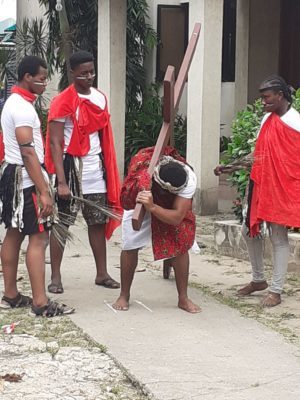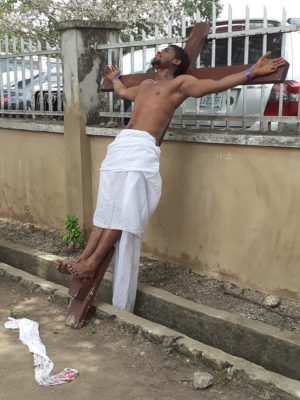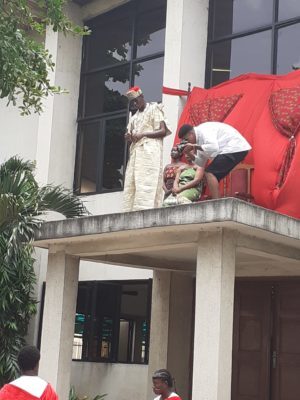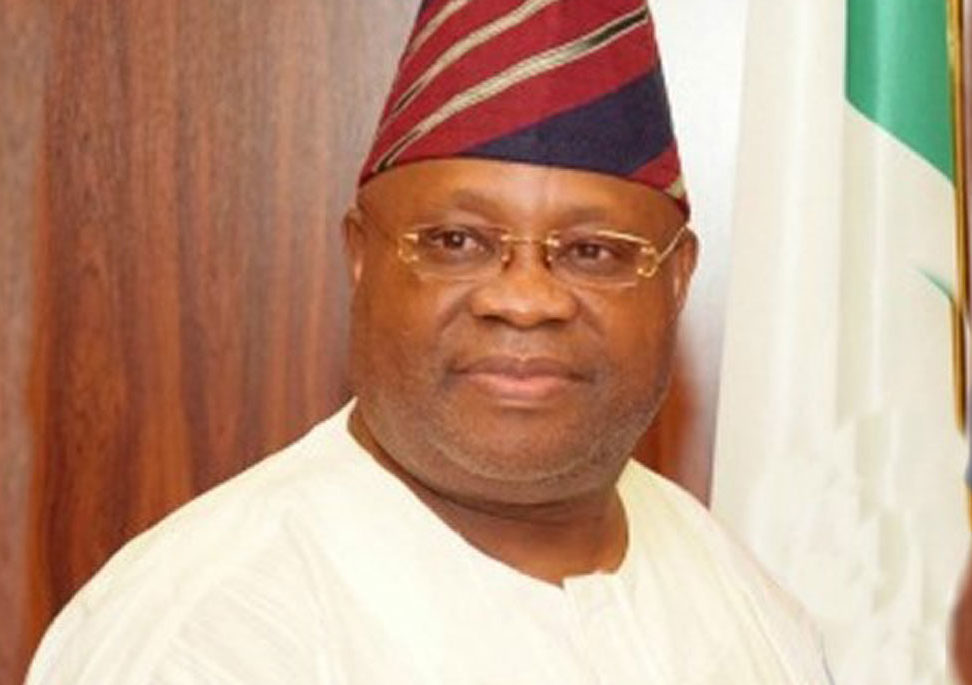Good Friday is usually a day of sober reflection for Christians. It is the day Jesus Christ gave his life for the salvation of humankind.
The story of Good Friday is one every Christian learns early on in life as it forms the foundation of the Christian faith.
It tells the story of Jesus’ condemnation by the Jews and His crucifixion at Calvary ending eventually in his Resurrection on Easter Morning.
For the Catholic faithful, one of the major events of Good Friday is the Stations of the Cross where they re-enact Jesus’ journey from the court of Pilate to the cross at Calvary.
And so it was that on Friday, members of the Divine Physician and St. Luke Catholic Church, Idi-Araba, joined other faithful across the world to re-enact the 14 Stations of Jesus. It was dramatised by the Theatre group of the Chaplaincy, mostly drawn from students of the College of Medicine, University of Lagos, Idi-Araba.
Some of the dramatists and members of the community spoke to the Next Edition on what it felt like and lessons learnt from participating in the sober event.
Miracle Oluebube Okeke, a 300L student of Physiology, College of Medicine, Idi-Araba, who played the role of Jesus Christ, described his experience thus: “The Passion of Jesus Christ has always been about the sacrifice that Jesus made. For me it’s a call to lay down or put down everything I’ve done in the past. When I talk about everything I’ve done in the past, I mean all the bad things I’ve done, every sorrow and pain I’ve passed through in this life. In playing the role of Jesus, I felt to an extent what Jesus felt though I know it was nothing compared to what Jesus really felt. I know that the ultimate price which Jesus paid was not something any man could do. Walking just the first two stations, it was like I almost died. I was like, is this what Jesus felt when he was actually going through all that.
“Basically, the lesson I learnt from this experience is that I just have to be that person in Christ whom he wants me to be, having been through a little bit of what he went through. Having known the pains he went through just to see that mankind is redeemed, I have no option but to be the kind of person He wants me to be. I pray for his grace as I strive towards that.”

Ekpereka Ezeobi, is a 400L student of Pharmacy and she played the role of Mary, Jesus’ mother. She said: “This is my second year acting Mary and playing that role has made me understand that the sufferings we pass through in life have meaning. It has made me understand that no matter how much someone hurts me or those I love; I owe them love because I did the same to Christ yet his mother loves me and even intercedes for me. So I owe everyone nothing but love. That is the ultimate lesson that I have learnt.
“Again, I have learnt that it’s not about self. You have to be selfless enough to really love. It’s teaching me to forget myself and put others first because it’s hard to love when it hurts, but to choose to love is greater.”
READ ALSO: Police Begin Investigation into Mysterious Death of Prophet in Enugu
Another actor in the drama, David Anochie, a 300L student of Medicine and Surgery, who played the role Pilate, said he has learnt not to be judgmental. His words: “Playing Pilate really put me on the spot because, I remember the first time I acted Pilate, I couldn’t give them what they wanted, and that is to crucify Jesus. It was really difficult for me to say ‘give them what they wanted.’ So, playing Pilate, I really felt what it must feel like for leaders on the hot seat to make these difficult decisions. If you make a decision that you feel is right, there is the fear of revolution from the people you are leading as in the case of Pilate and if you make a decision that is wrong, of course there is a problem.
“It also paints the picture that one major sin of our world especially the 21st century, is indifferent. The sin of indifference is the cankerworm eating into our nation and our lives. Pilate being indifferent and self righteous was the reason Jesus died. He could have saved Jesus from dying. Twice he said he was going to release him. Once he proclaimed he had found no crime in Jesus and that he would release him, but he didn’t. So his being indifferent was why Jesus died because he had the power to free him.
“The drama and the story have taught me about the sin of indifferentism and what leaders feel when they have tough decisions to make. The drama has taught me not to be judgmental when people in authority make decisions that we feel is not right because it is not easy.
“I have realised it’s not always cut and dry to make the decisions.”
Harrison Udeh, a 500L nursing student played Judas Iscariot in the drama. He said: “Last year, I acted Jesus so this year I wanted to know what it felt like to be on the other side. And I have realised after playing the role that betraying someone could be a heavy burden to bear. I really felt bad after I betrayed Jesus and the experience has taught me to think twice before betraying anyone.”
For Prof. Jayne Ajuluchukwu, watching the dramatisation of the Stations brought the message of salvation as well as the pain and suffering that Jesus went through in order to save mankind closer home.
“Throughout the period of lent, I come for the Stations and each time, I feel bad and pray to God that I should change. But with the dramatisation, the message cuts deeper, Jesus’ suffering is more glaring. The women are crying and it is not just cry and stop but continuous crying as Jesus struggles to carry the heavy cross, bear the beatings and sometimes falling down. All these made the whole thing more real for me.
I have heard the story of the crucifixion many times but every year there is something new to learn. For me, the most painful part is the fact Jesus had been telling the people that he was the son of God but they wouldn’t believe him. They were busy shouting crucify him, yet the moment he died, somebody immediately said, truly he was a good man, when he cannot be brought back.
The lesson there for me is that we need to use opportunity when we see it to avoid regrets,” she said
In his homily during the service following the Stations, Rev. Fr. Jide Arowosafe SJ., admonished Christians to reflect on the significance and meaning of the Cross in their lives. He also urged all to emulate the life of Christ.












